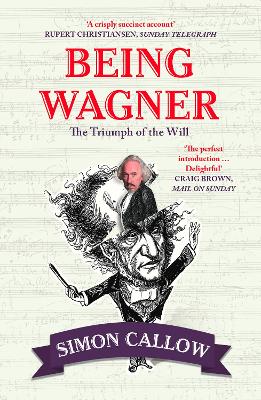I read this as a buddy read with BrokenTune, and was woefully inadequate with the status updates, but thankfully, some sidebar chats with her during and after our read, have helped me clarify my thoughts about this fantastic book enough to write some of them down.
Richard Wagner was, arguably, one of the most influential composers and conductors in the history of classical music. He changed the face of opera from top to bottom; from the way the music was played, the notes were sung, the lighting, even the shape of the theatre itself. He made opera dramatic storytelling. I'm not even sure I can imagine what it was before he turned everything and everyone on their ear.
Richard Wagner was also an unmitigated ass. Not merely arrogant; not merely selfish; Wagner was self-involved, egotistical, short-sighted, fiscally irresponsible and anti-semitic. Additionally, he was described as short, stoop-shouldered and afflicted with an appalling skin condition; we're not talking run-of-the-mill eczema here - words like 'sores' and 'pustules' were used. I mention the physical challenges here because in spite of all of this - the horrible character flaws and the physical challenges - he was apparently charismatic as hell. The crap he got away with, the abuse people took only to come back for more, the sheer number of people who shelled out money to pay his debts and provide him with housing is mind-boggling. Not just in Germany, but in Switzerland, Italy and the UK. All this, and he was not a good person.
I could have probably overlooked the childish selfishness; I could chuckle over his inability to stay out of any riot he crossed paths with. I might argue (weakly), that the trail of broken relationships he left behind him his whole life were people who knowingly attached themselves to this horrible man. But the anti-semitism is a deal-breaker. HIs disparagement of Jews was grossly casual, brutal, unwarranted and irrational. Worse, it was not a phase he outgrew, but a mania that only became more brutal and irrational with age, even though he continued to work with Jewish conductors, musicians and composers until the end.
So Wagner was both artistically brilliant and a horrible human being. This fascinating dichotomy is made still more fascinating by Simon Callow's writing. He masterfully writes this condensed biography with the utmost objectivity, clarity, and just a dash of humor in unexpected places. I doubt very much I could have read any other book about Wagner without dnf'ing it simply because I wouldn't have been able to swallow Wagner's life, but Callow made it not only palatable, but compelling.
Wagner may have created some of the most powerful music ever written - at least some of the most unforgettable - but his music will forever be tainted for me now that I know the man behind it better. The real star that came out of this book, for me, is Callow; his writing ... well, take it as read that I'm gushing over it, because it's some of the best biographical writing I've ever read (not that I read a lot, mind you).
If you're interested in Wagner but don't want a long academic biography, you should absolutely investigate this book; it's fair, it's balanced; it's unbiased and it's excellently written. The 1/2 star I took off was more my shortcoming than his - my eyes glazed over during the descriptions of the operas' stories, because I'm not a fan of opera. Seriously, ignore that and just check out the book.
